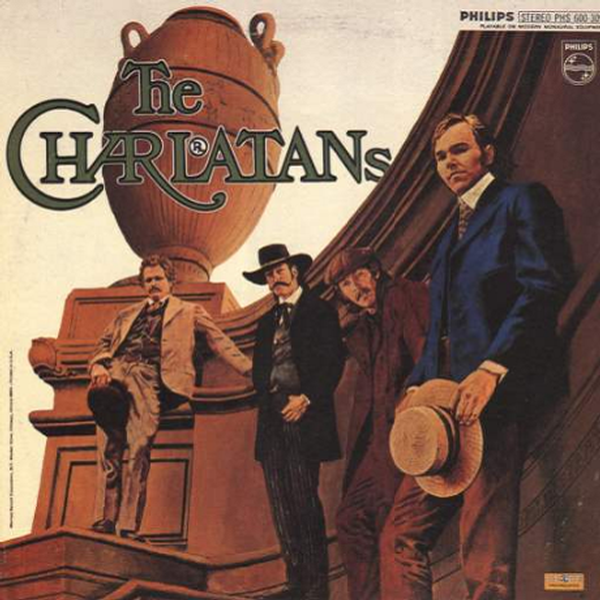






From: San Francisco, CA, USA

Though not as well known as other San Francisco bands like the Grateful Dead and Jefferson Airplane, the Charlatans are widely accepted as being one of the first 60s psychedelic rock groups and true pioneers of their craft, forming in September, 1964. This honor is due in large part to their six week residence at the Red Dog Saloon in Virginia City, Nevada, where patrons took steady doses of then legal LSD while listening to the band's lively sets. These early "happenings" in the summer of 1965 were the precursors to the Acid Tests and other live shows that routinely combined music and mind altering substances as part of the psychedelic experience. The original lineup consisted of George Hunter (vocals, autoharp), Dan Hicks (drums), Mike Wilhelm (guitar), Mike Ferguson (piano) and Richard Olsen (bass). Hunter and Ferguson are also credited with designing the very first psychedelic rock poster, nicknamed "The Seed", which advertised the Red Dog shows.
A drug bust in Nevada prompted the group to return to San Francisco where their 19th century old west attire and gritty songs made them a hot live attraction. They soon signed with Kama Sutra and were assigned Lovin' Spoonful producer Eric Jacobsen. 'Codine Blues', written by Buffy Saint-Marie, was recorded and planned as the band's first single. Hunter's eerie autoharp and Wilhelm's bluesy solo made this a proto-psychedelic classic, but the label got cold feet over the song's title and lyrics and instead released 'The Shadow Knows', a song the group didn't even want to record. The single failed miserably, denying the band the chance to record a full-length album.
In 1967, the Charlatans went back in the studio to record some of the best material that they had been playing live for years. Hicks emerged as the group's main writer with the sarcastic 'How Can I Miss You When You Won't Go Away' and the excellent 'We're Not On The Same Trip', while Hunter chipped in with the evocative 'Walkin'. Despite the quality of the material, a recording contract didn't materialize prompting Ferguson to be replaced by Patrick Gogerty (keyboards). More recording was attempted in 1968, but a lack of success prompted Hicks, Hunter and Gogerty to leave the band. Wilhelm and Olsen then recruited Terry Wilson (drums) and Darrell DeVore (keyboards, vocals) for a self-titled LP that eventually saw release during the spring of 1969 on the Philips label. Folk-rock and psychedelia are found throughout most of the album in songs such as 'Easy When I'm Dead', 'Time To Get Straight' and their signature song, 'Alabama Bound'. An outstanding version of Johnny Cash's 'Folsom Prison Blues' shows the band's flair for choosing excellent cover songs and playing them in their own eclectic style.
A brief reunion by the original five band members in 1969 wasn't enough to entice them to carry on, and they disbanded once again. Hicks went on to reap success in his band Dan Hicks & The Hot Licks while Wilhelm became a member of the Flamin' Groovies from the late 70s through early 80s. In 1996, their catalog of unreleased recordings was finally issued on the CD The Amazing Charlatans, while their self-titled 1969 album also remains in circulation. The band had reunited multiple times over the years, most notably in 1997 and 2007 for the 30th and 40th Anniversaries of the Summer of Love in Golden Gate Park, San Francisco, CA...we were there for both! Unfortunately, Ferguson, Hicks and Wilhelm have now since passed away, bringing final closure to one of the most pioneering psychedelic bands of the Bay Area.
Article researched and written by Matt Williamson & Paul Moews. Artist photo courtesy of Herb Greene.
Codine
(Originally Unreleased Demo - 1966)

Songs from this album played on TWOS:
(Original 45 Label: Philips 40610, A - May, 1969)
(Original 45 Label: Philips 40610, B - May, 1969)

Songs from this album played on TWOS:
(Originally Unreleased Demo - 1966)
(Original 45 Label: Kapp 779, B - October, 1966)
(Originally Unreleased Demo - July, 1967)
(Originally Unreleased Demo - July, 1965)
(Originally Unreleased Demo - 1966)
(Originally Unreleased Demo - 1966)
(Originally Unreleased Demo - 1966)
(Originally Unreleased Demo - July, 1967)
(Originally Unreleased Demo - July, 1967)
(Originally Unreleased Demo - 1968)
(Originally Unreleased Demo - August, 1965)
(Originally Unreleased Demo - August, 1965)
(Originally Unreleased Demo - 1968)
(Originally Unreleased Demo - July, 1967)
(Original 45 Label: Kapp 779, A - October, 1966)
(Originally Unreleased Demo - 1966)
(Originally Unreleased Demo - July, 1967)
(Originally Unreleased Demo - July, 1967)